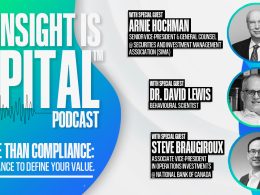The Day the Globalization Music Died
by William Smead, Smead Capital Management
As a participant for 36 years in the U.S. stock market, I’ve learned to look for watershed events that must be respected by investors. A watershed event is a point in time where a major secular change takes place. Britain’s vote to leave the European Union appears to be one of those events. We’d like to use the poetry of Don McLean in his song “American Pie” to help our readers understand our view.1
“A long, long time ago
I can still remember how that music used to make me smile
And I knew if I had my chance
That I could make those people dance
And maybe they’d be happy for a while”
We at Smead Capital Management have argued that investors should concentrate their investments on domestic companies that can make the most from the favorable demographics in the U.S. Those who have benefitted from globalization “can still remember how that music used to make me smile.” Energy, basic material, heavy industrial, multi-national staple, and technology companies feasted on a weak U.S. dollar and made a growing stream of foreign revenue “dance” as the world suckled for ten years on China’s economic boom. Investors were “happy for a while.”
“But February made me shiver
With every paper I’d deliver
Bad news on the doorstep
I couldn’t take one more step”
The vote in Britain on June 23, 2016 has made everyone “shiver” and brought “bad news on the doorstep.” Stocks in the U.S. have fallen sharply on the news. Ironically, some of the most domestic companies we own are getting hit harder than the overall stock market. Homebuilder (NVR), network- affiliated TV station operator (TGNA) and U.S.-centric conglomerate Berkshire Hathaway (BRK) initially sold off more than the index itself. Large U.S. and primarily domestic banks like Bank of America (BAC) and Wells Fargo (WFC) declined more than any of our other holdings. It is enough to make you hestitate before you “take one more step.”
“I was a lonely teenage broncin’ buck
With a pink carnation and a pickup truck
But I knew I was out of luck
The day the music died”
This has been a difficult and “lonely” year for those of us who believe that companies that fit our eight criteria for common stock selection, and are priced at a discount to the average stock, should outperform. We are very aware how markets can go on for quite a while disagreeing with our long-duration view of things. However, when you own wonderful companies with strong balance sheets and long histories of success, you are never “out of luck” because of temporary stock market movements. The long-term future is the friend of the owner of a meritorious business, as long as you don’t get off the train too early in the journey.
“I can’t remember if I cried
When I read about his widowed bride
But something touched me deep inside
The day the music died”
In our opinion, Britain’s watershed change does not rank up there with the death of a spouse for the “widowed bride” of Buddy Holly, especially as it pertains to investors in U.S. common stocks. Much like economic recessions, the negative consequences of this decision and the death of the global infatuation shouldn’t stop you from being invested. We particularly want to own companies who stand to benefit from the U.S. being the only large developed nation in the world with more people between 25-35 years old than those age 55-65.
“Oh, and there we were all in one place
A generation lost in space
With no time left to start again
So come on, Jack be nimble, Jack be quick
Jack Flash sat on a candlestick
‘Cause fire is the devil’s only friend”
We believe the biggest problem the U.S. economy and the stock market have is that our largest population group (millennials age 21-39) has been a “generation lost in space.” They have waited much later in life to get married, because the majority of them went to college. At about the time that their life should have started coming together, they lived through the aftermath of the biggest financial meltdown since the 1930s.
This extended post-meltdown phase caused the U.S. to be the country of movies designed to make us laugh about immature 26-year old men, as we watched them seek ruin with recreational drugs, alcohol and bachelor parties. We saw our culture get organized around feeding and entertaining single 25-35 year old people. They “are all in one place” (large cities) and their primary expense was rent. We became a renter nation!
Thank goodness a large portion of the millennials are in their thirties “with no time left to start again.” A recent Wall Street Journal chart (shown below) shows a huge uptick in births among women 30-39, and if you sit down with the numbers, you’ll see an anticipated explosion in the absolute number of 30-39 year olds over the next six years.2

A baby boom is probably upon us among 30-39 year old Americans, and the economic activity associated with marriage, babies, cars that fit car seats and buying houses is very bullish for our economy. Americans 24 years of age are the largest single age year in the U.S. population make up! Watch to see how “nimble” and “quick” Jack and Jill will be when they honeymoon at age 32.
“I met a girl who sang the blues
And I asked her for some happy news
But she just smiled and turned away
I went down to the sacred store
Where I’d heard the music years before
But the man there said the music wouldn’t play”
While everyone else is singing “the blues” (the same negative nabobs who have been trotted out for the last seven years), call us for the “happy news.” We will “smile” and not “turn away” because long-duration ownership of good quality companies has out lived every major watershed event for the last 36 years and we see it outliving this one. Temporarily lower prices and fears of the negative effects of unwinding globalization are no “sacred store.” We will stick with our discipline and are pleased it is tilted toward economic success inside the U.S.
Warm Regards,
William Smead
1Don McLean, American Pie. United Artists Records, 1971.
2Source: The Wall Street Journal
The information contained in this missive represents Smead Capital Management’s opinions, and should not be construed as personalized or individualized investment advice and are subject to change. Past performance is no guarantee of future results. Bill Smead, CIO and CEO, wrote this article. It should not be assumed that investing in any securities mentioned above will or will not be profitable. Portfolio composition is subject to change at any time and references to specific securities, industries and sectors in this letter are not recommendations to purchase or sell any particular security. Current and future portfolio holdings are subject to risk. In preparing this document, SCM has relied upon and assumed, without independent verification, the accuracy and completeness of all information available from public sources. A list of all recommendations made by Smead Capital Management within the past twelve-month period is available upon request.
© 2016 Smead Capital Management, Inc. All rights reserved.
This Missive and others are available at www.smeadcap.com.
Copyright © Smead Capital Management















